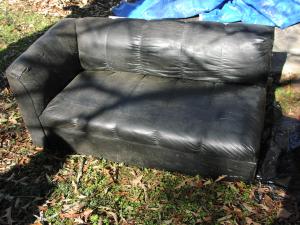
His place was on the way to mine. The movie was fine, dinner less so. But at least he had a sense of humor about the dinner. What were we thinking, going to Cafeteria?
Our laughter then was the only moment that I thought we might have a future. But a few bites later I decided it was the future of the friend, not the lover. The friendly acquaintance. He wasn’t right pheremonally. I can usually tell right away. If I have a type, it’s ineffable and pheremonal.
We stopped at his door. “Wanna come up?” And I hemmed, a bit, and hawed. I’d steeled myself for this moment by talking, early at dinner, once I knew he was all wrong, by talking about having to meet my trainer in the morning.
“Sure,” I said. Why? Why was I so weak? Was it politeness? I hated myself immediately. He offered to play a “potpourri” of funny video clips he’d gathered over the years as we climbed the stairs.
I’ve never been one of those fags who knows shit about what goes with what and where. I always figured I’d fall in love with one and he’d do all of that. But I knew the living room was all wrong. I’m not the creative type, but I can judge. And the sofa was tiny. He got a couple of Sam Adams Lights and I stared at the flat-screen television that was way too big for the room.
He sat on one end of the sofa. I sat on—well, the rest. Our legs touched. I tried to adjust the red velveteeny pillow, but it had nothing to grab its little tendrils onto—it just slid me toward the center, like a satiny sled. Into him. His arm went around my shoulders, maybe because there was nowhere else it could go. Did he plan this when he bought the sofa? I wondered as he put his face close to mine, and I felt my lips part, in spite of themselves.
JEFF WHITTY


